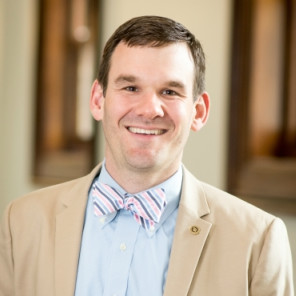Take 5 with Matthew Clifford
Matthew Clifford
Assistant Vice President of Campus Life and Dean of Residence Life and Housing at Wake Forest University
1. How do you define success for yourself? What has helped you to be successful?
I used to think of success in a more traditional, ladder-climbing perspective. I thought to be successful meant that I was reaching for the next thing. My thinking has evolved; success for me is more of a symbiotic relationship now. I am successful if my unique gifts and talents are put to good use and if I am growing as a result of my experiences.
I’ve been successful when I have found opportunities for that sort of equal benefit, where I am gaining as much as I am giving.
2. Think of a time that you faced a challenge, obstacle, or roadblock. How did you get through that and what did you learn?
I’ve certainly encountered my fair share of obstacles but I’ll tell a story about one that our students might recognize. I was a rising college senior and wanted to enroll in the English honors program, which required a thesis. Before the spring semester of my junior year finished, I submitted my topic and plan. Much to my surprise, it was denied. I found one of my trusted professors and mentors to ask about my options. She advised me that I could resubmit the proposal but it would take some work. I was going to spend the summer abroad in Prague and rewriting my thesis proposal was not on the list! My mentor gave me a list of books to read and said she would read the revised copy before the fall semester started. I flew to Europe with an extra suitcase full of books and committed to resubmitting a successful proposal. I realized how bad my first proposal had been and finished my thesis before I graduated. I learned to rely on other people to help me see setbacks from a different perspective. I was clearly only seeing rejection but my mentor helped me see a pathway forward.
3. Who are your people (either by name or role) who help you to be successful/confident/intentional/reflective/any other descriptor you want to use? And how have they helped you?
At Wake Forest those people are Adam Goldstein and Penny Rue. Each of them challenges me to think about problems in different ways and to reflect on our collective challenges.
I did my doctoral research on the mentoring experiences of new professionals in higher education. I found that four types emerged – the mentor as friend, cheerleader, teacher, and ideal. I think that generally holds for me still. I have people in my life upon whom I rely for those things. The people have changed, at times, but what they give me has stayed constant.
4. How did you find your people?
I tend to build relationships through a common task. I have found my people by being on the same team, working on a project together, or volunteering for an organization. When I’m working with someone and our skills and attributes complement one another, we usually want to work together again (or just hang out)!
5. What advice would you give to Wake Forest students as they look for their people?
Surrounding yourself with people from the same background as you won’t allow you to broaden your perspective. You’re bound to see the world and problems from a single lens. Seek different perspectives because your approach might not always be the best. Finding your people is also an active process – they won’t just fall into place.

